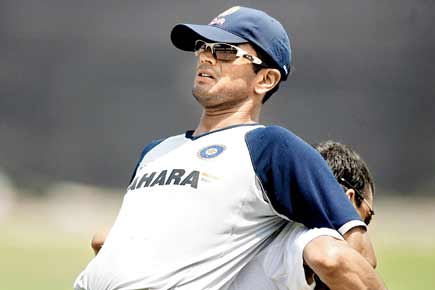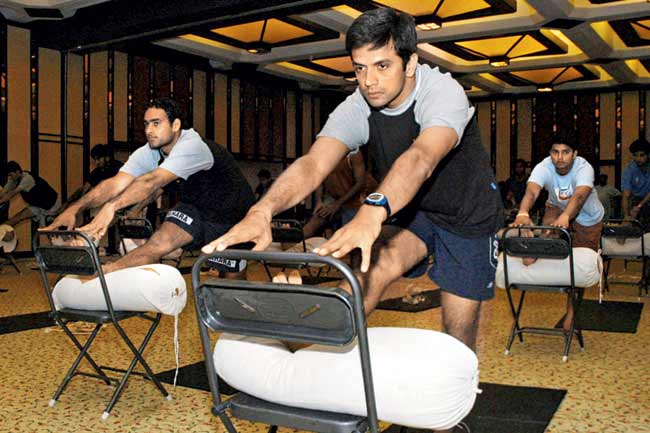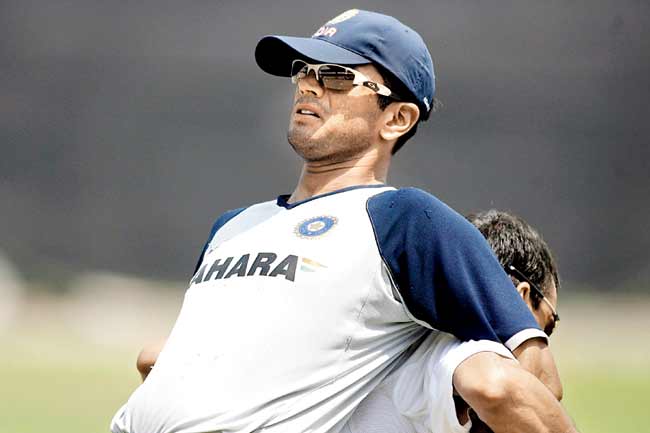Known for his calmness on the field and resoluteness in front of the wicket, the former Indian captain and cricketer Rahul Dravid shares a few tips on how to survive mundaneness at the workplace

Rahul Dravid
The modern workplace is nothing short of a boiler room, where everyone is reaching up to a breaking point, everyday. Some manage to survive while others don’t. But when it comes to surviving such breaking points, there is no better example in real life than former Indian cricketer, Rahul Dravid, whose calmness on the field continues to inspire many even after his retirement.

Rahul Dravid relies a lot on meditation and yoga to stay calm. PIC/AFP
ADVERTISEMENT
Dravid’s 16-year international career spanned 164 Test matches and 344 ODIs. In this period, he scored over 24,000 runs and hit 48 centuries in both the formats. Yet, the 41-year-old has never been associated with altercations on the field.
So, how is it that the cricketer has always managed to stay calm when everything else around him seems to be falling apart? “I think I have always been lucky with my temperament. I have always been very calm since I was a kid. I try to keep it that way, and stay in my own bubble, because when I get angry on the cricket field it never works for me,”
says Dravid.
 Rahul Dravid performs yoga exercises with the assistance of yoga expert Sukhdev Kumar. PIC/AFP
Rahul Dravid performs yoga exercises with the assistance of yoga expert Sukhdev Kumar. PIC/AFP
Tackle the expectations
The cricketer, who was recently in the city for a promotional event by Gillette, says that people’s expectations often play havoc with our minds — be it colleagues, friends, family or fans. “It’s important to know that one can’t live up to everyone’s expectations. You can only be the best you can be. You have your own expectations, and you should try to be the best you can be in them. Sometimes, you are lucky, and things fall in place. But on other occasions, you aren’t, and you should accept that, too. Try to move on and find something new that you would like. You can’t kick yourself,” he advises.
However, a bit of introspection is always good, advises the former cricketer, often referred to as The Wall on the pitch.
“A bit of introspection and analysis is good for your performance; what you have done and how the day went. But you should not overdo it. I do it for a short time, and then I try to take my mind off cricket,” he shares.
Enjoy your work
Dravid adds that a lot of time, people are unhappy at the workplace because they don’t enjoy what they do. “You have to really enjoy what you do. And, take things one day at a time,” he suggests. But what if you can’t find a job that you would really like? Dravid replies, “Finding a job you like is a big challenge, really. But even if you don’t have a job that you really like, things become easier if you find a part of the job that you like, something you want to be really good at, or that you want to be part of. Also, I think connecting with people in your job and building meaningful relationships at your workplace is really important.”
Expert talk
Why do some people give in to the pressure, while others don’t?
Many people have an evolved emotional intelligence, which allows them to stay calm even in an emotionally uncomfortable situation. A lot of it depends on your choice mechanism. You can either lose your cool and react or remain calm and respond. But it’s not something you can’t work on.

How can you work on your behaviour choices?
Focus on the real issue: Try deep breathing to release the stress and focus on the real issue at hand.
Find the real cause: Self-introspection helps to analyse and find the real cause. Often, people break/snap because there’s a feeling of injustice being done to them at the workplace. Self-introspection will help you find a way out of it.
Meditate: A misplaced anger can create more problems than help find solutions. Meditation helps you be aware of the source of the anger.
Find some ‘me-time’: Sometimes, sitting by yourself for 10 minutes along with deep breathing helps.
Remember, it’s not always about you: Make it a common practice to look at a situation from the other person’s perspective. Consciously changing your perspective to make it about someone else, helps in a lot of situations. For example, if a friend doesn’t greet you, chances are that he/she is in a problem. Perhaps, they need help but are unable to ask.
Why is changing one’s behaviour difficult among adults?
Mark Knowles, in his theory of adult learning, explains that adults don’t learn until it’s relevant to them. When things are the same, they don’t pay attention. It’s when situations change that adults realise that they don’t have the resources to deal with the problem. This usually causes breakdown among adults.
Common behaviour personalities at the workplace
* People demonstrating a victim mentality, have trained themselves into thinking negative thoughts, often referred to as Negative Automatic Thoughts (NATS). Such people believe that the world is unfair, uncertain and thus, whatever happens is not a personal responsibility. Such people have a tendency to blame others and this shows up as a behavioural issue.
* Conversely, those who believe that life is what it is, always look inward to understand if they can do a bit to make things better. They demonstrate a correspondingly higher degree of resilience. These are people who have trained themselves to optimise every situation in their life. They might stumble, even fall, but they choose to get up instead of lying down. They derive positivity and learn from the worst situations.
 Subscribe today by clicking the link and stay updated with the latest news!" Click here!
Subscribe today by clicking the link and stay updated with the latest news!" Click here!







